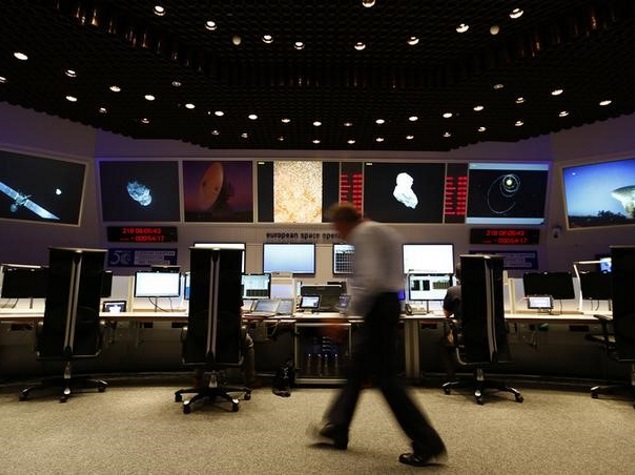- Home
- Science
- Science News
- ESA Recovers Wayward Galileo Satellite; Says May Still Be Usable
ESA Recovers Wayward Galileo Satellite; Says May Still Be Usable

The mishap in August was one in a series of setbacks to the multi-billion-euro Galileo project, which has been beset by delays, financing problems and questions about whether Europe really needs a rival to the U.S. Global Positioning System, widely known as GPS.
The two satellites, the fifth and sixth of a planned 30 for Galileo, were launched aboard a Russian Soyuz rocket on August 22 and ended up in an elongated orbit travelling up to 25,900km (16,094 miles) above earth and back down to 13,713 km rather than completing a circular one.
While they were still functioning, the misshapen orbit meant that they would not be able to perform their job properly as part of Galileo.
The European Space Agency (ESA) said on Wednesday that the fifth satellite has now performed 11 manoeuvres over 17 days to gradually shift to a more circular orbit and will run through a series of tests over the coming days.
Similar recovery manoeuvres are planned for the sixth satellite.
"The decision whether to use the two satellites for navigation and (space radar) purposes as part of the Galileo constellation will be taken by the European Commission based on the test results," ESA said.
The EU has approved a EUR 7-billion budget for Galileo and another navigation project between now and 2020. It says Galileo will strengthen Europe's position in a satellite-navigation market expected to be worth EUR 237 billion in 2020.
Airbus Defence & Space led construction of the first four satellites, while Germany's OHB and Britain's SSTL are building the next 22.
© Thomson Reuters 2014
Get your daily dose of tech news, reviews, and insights, in under 80 characters on Gadgets 360 Turbo. Connect with fellow tech lovers on our Forum. Follow us on X, Facebook, WhatsApp, Threads and Google News for instant updates. Catch all the action on our YouTube channel.
Related Stories
- Samsung Galaxy Unpacked 2026
- iPhone 17 Pro Max
- ChatGPT
- iOS 26
- Laptop Under 50000
- Smartwatch Under 10000
- Apple Vision Pro
- Oneplus 12
- OnePlus Nord CE 3 Lite 5G
- iPhone 13
- Xiaomi 14 Pro
- Oppo Find N3
- Tecno Spark Go (2023)
- Realme V30
- Best Phones Under 25000
- Samsung Galaxy S24 Series
- Cryptocurrency
- iQoo 12
- Samsung Galaxy S24 Ultra
- Giottus
- Samsung Galaxy Z Flip 5
- Apple 'Scary Fast'
- Housefull 5
- GoPro Hero 12 Black Review
- Invincible Season 2
- JioGlass
- HD Ready TV
- Latest Mobile Phones
- Compare Phones
- Tecno Pova Curve 2 5G
- Lava Yuva Star 3
- Honor X6d
- OPPO K14x 5G
- Samsung Galaxy F70e 5G
- iQOO 15 Ultra
- OPPO A6v 5G
- OPPO A6i+ 5G
- Asus Vivobook 16 (M1605NAQ)
- Asus Vivobook 15 (2026)
- Brave Ark 2-in-1
- Black Shark Gaming Tablet
- boAt Chrome Iris
- HMD Watch P1
- Haier H5E Series
- Acerpure Nitro Z Series 100-inch QLED TV
- Asus ROG Ally
- Nintendo Switch Lite
- Haier 1.6 Ton 5 Star Inverter Split AC (HSU19G-MZAID5BN-INV)
- Haier 1.6 Ton 5 Star Inverter Split AC (HSU19G-MZAIM5BN-INV)







![[Partner Content] OPPO Reno15 Series: AI Portrait Camera, Popout and First Compact Reno](https://www.gadgets360.com/static/mobile/images/spacer.png)









